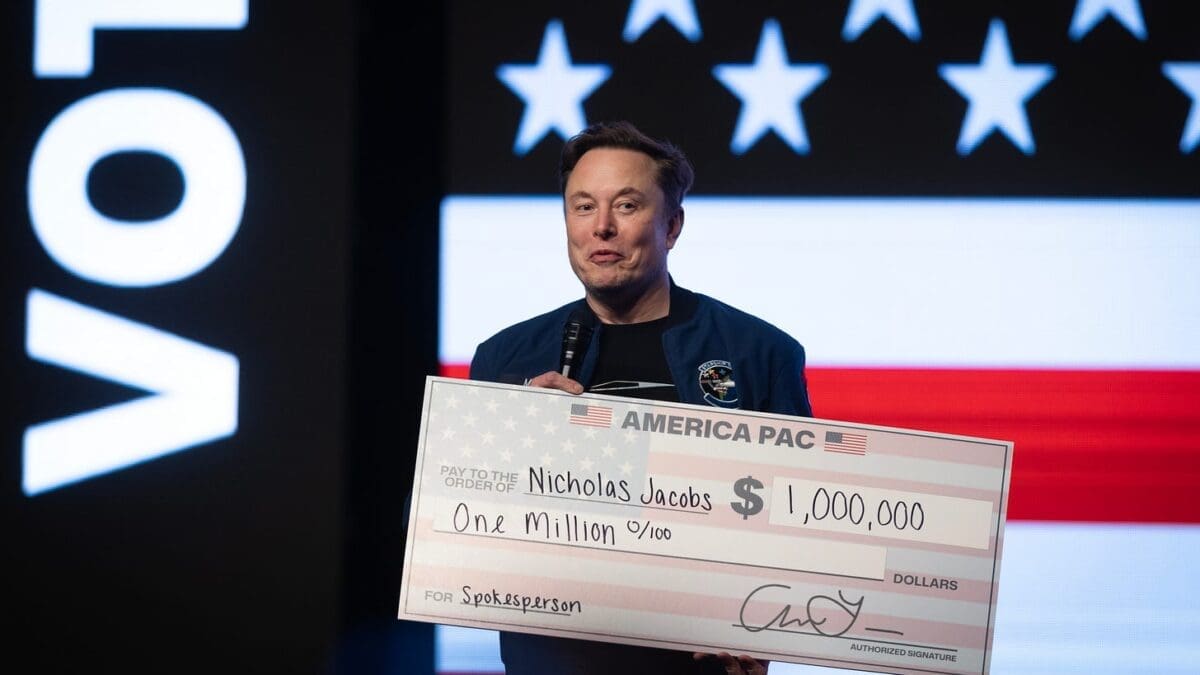
Tariffs Weaken American National Power
April 8, 2025
It’s sexual assault awareness month and HHS just gutted its rape prevention unit
April 8, 2025IN THE BAD OLD DAYS of corrupt party machines—think Tammany Hall and the like—voter bribery was rampant. It took a variety of forms—most famously patronage, handing out public-service jobs controlled by the party bosses. But sometimes it was as simple and direct as literally handing people cash for showing up at the polls and casting a ballot. The amount would typically be small, the equivalent of a few dollars in today’s money. Or if you’re George Washington standing for Virginia’s colonial legislature, it could be “treating the voters” to several gallons of free booze.
The adoption of the secret ballot (also known as the Australian ballot) around the turn of the twentieth century was one reform intended to defeat such corruption. Still, vote buyers could be confident most people paid off in this manner would vote as expected, even if their ballots couldn’t be individually confirmed.
Today, voter bribery is a crime. It’s illegal to pay people for their participation in an election, plain and simple. Despite this, Elon Musk has been flagrantly bribing voters, both in last year’s presidential election and most recently in the high-profile election for a seat on the Wisconsin Supreme Court. The race attracted huge amounts of national interest because the court’s ideological majority hinged on the outcome, and with it litigation over the state’s gerrymandered legislative maps. (Wisconsin judicial elections are nominally nonpartisan, but it is widely understood which candidates are de facto Republicans or Democrats.)
Musk has attempted to evade prohibitions on vote-buying in a number of ways, But his pretexts do not, in fact, make any legal difference, and the intention behind them is plain as day.
Through his political action committee, Musk has circulated and promoted “petitions” consisting of simple, generic statements such as opposing “activist judges.” Signers of the petitions were then entered into a drawing to receive million-dollar checks. Musk notoriously deployed the same idea in swing states before the 2024 presidential election, prompting the Justice Department to warn him that the scheme was likely illegal. He’s tweaked the details, but the essence remains the same: sign my pretend petition, get entered into the million-dollar prize lottery, but only if you’re a registered voter.
Additionally, Musk announced a rally in Wisconsin the Sunday before the election, at which only people who had already cast an early ballot could attend, with two million-dollar checks to be distributed. He quickly deleted the post, presumably having been advised this was even more blatantly over the legal line, and reverted to his usual bit about registered voters who’d signed a petition.
Wisconsin Attorney General Josh Kaul, a Democrat, tried to obtain an injunction against Musk, particularly on the clearer-cut issue of the cash prizes being contingent on casting a ballot. But after lower courts ruled against Kaul, the Wisconsin Supreme Court—the same one whose liberal majority would be decided in the election in question—unanimously declined to intervene (without offering a rationale). Kaul’s hands were tied as to possible criminal charges because prosecuting this type of offense falls under the jurisdiction of local district attorneys in Wisconsin.
The key point in Musk’s schemes was that only registered voters (or, briefly, before he recanted it, people who had already voted) were eligible for the putative lottery ticket. By design, the reward is not something anybody can sign up for, but only people who qualify by their electoral participation. And tying a cash payment to any aspect of the voting process is an unambiguous crime under both state and federal laws.
Here’s how the felony is defined in federal law (18 U.S.C. § 597): “Whoever makes or offers to make an expenditure to any person, either to vote or withhold his vote, or to vote for or against any candidate . . . [or] solicits, accepts, or receives any such expenditure in consideration of his vote or the withholding of his vote” can be punished by up to two years in prison. In other words, both paying the bribe and accepting the bribe are illegal.
Another statute (52 U.S. Code § 10307(c)) specifies that “Whoever . . . pays or offers to pay or accepts payment either for registration to vote or for voting shall be fined not more than $10,000 or imprisoned not more than five years, or both.” This provision is limited to federal elections, but in Wisconsin as in most other states, registering to vote does not distinguish between state and federal elections. Somebody registering to vote in an upcoming state judicial election is thus also registering to vote in elections for federal office. And of course, the presidential race in which Musk operated a similar gambit was a federal election.
As explained by DOJ’s election crimes manual for prosecutors, these federal laws cover anything “intended to induce or reward the voter for engaging in one or more acts necessary to cast a ballot,” including voter registration drives where any payment is “shared with the person being registered.” “Lottery chances” are specifically mentioned as an example of an illegal thing of value.
Wisconsin law also makes payment for voter turnout illegal, as election law expert Rick Hasen notes at the Election Law Blog. In particular, under Wis. Stat. 12.11(1m)(a)(2), it is a crime to “Offer[], give[], lend[] or promise[] to give or lend, or endeavor[] to procure, anything of value . . . to, or for any elector . . . in order to induce any elector to . . . Vote or refrain from voting.”
Attempting to evade the law by making payments for registering to vote but not for voting as such is an absurd pretext. The law is not so easily fooled. It would be like paying somebody to fill out a ballot but then pleading you didn’t pay them to actually cast it. It doesn’t take a strained reading of the law or any tortured logic to see how, in this case, registration to vote is merely a proxy for voting, and the so-called petition is a paper-thin pretense for rewarding only one party’s voters.
Ironically, this harebrained plot didn’t actually motivate a sufficient number of people to swing the election. Almost all, perhaps literally all, of the voters who were politically engaged enough to participate in Musk’s giveaway would have cast a ballot for the Republican candidate anyway. And the expected value of a single one of these “lottery” entries is itself a trivial sum, a few bucks, assuming a random draw. You’d have better return on investment playing the real lottery.
The nominal focus on voter registration also makes no sense in Wisconsin, a state with same-day registration at the polls, and thus no deadline to make sure your party’s voters meet in advance. The results speak for themselves: The Republican candidate lost by a comfortable margin, as was widely expected.
If Musk wants to spend his mountains of money on influencing elections, he’d be much better advised to spend it on more traditional campaign tactics such as get-out-the-vote canvassers and advertising, which can be done by his political action committee. Indeed, he largely did fund Trump’s GOTV effort in 2024, though it’s unclear how effective that effort was. But deferring to experienced practitioners in a given field, the people who actually know what they’re talking about, isn’t exactly his style. Instead his habit is to rush in with his own half-baked amateur ideas. It’s cartoonish, literally trying to buy an election by doling out money to voters.
All the same, ineffectiveness and incompetence don’t transform an illegal conspiracy into a legal one.
Musk’s legal impunity represents a grotesque breakdown of the rule of law. Because he is powerful and unimaginably wealthy, for several months now Musk has been eagerly and proudly organizing unlawful vote-buying in plain public view. People have gone to prison for months and even years for schemes by small-time local politicians to buy votes with petty cash. But apparently if you instead hand out million-dollar checks, the justice system will look the other way.
Corrupting elections in this manner undermines the value and efficaciousness of everyone else’s right to vote. Allowing such behavior to go unchecked destroys the integrity of free and fair elections and democratic self-governance.
To be sure, it is not illegal, and in many respects it is protected by the First Amendment, to donate money to campaigns and to engage in advocacy for or against candidates. If Musk wants to use his immense wealth in this manner, he is within his legal rights to do so. But committing crimes anybody else would be sent to prison for is not something he is entitled to do.
We must strenuously reject this kind of elite impunity, especially when it is flaunted for everyone to see. “Laws for thee but not for me” is neither moral nor sustainable—even when the “me” is the richest man in the world.
Great Job Andy Craig & the Team @ The Bulwark Source link for sharing this story.







